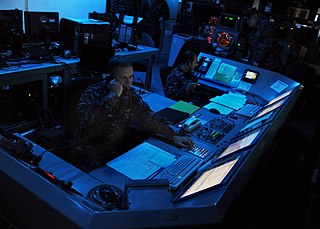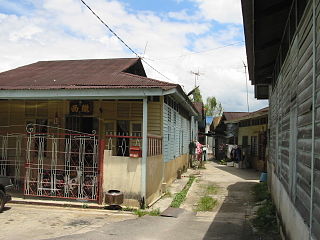Related Research Articles
Military doctrine is the expression of how military forces contribute to campaigns, major operations, battles, and engagements.

The Malayan Emergency, also known as the Anti–British National Liberation War(1948–1960), was a guerrilla war fought in British Malaya between communist pro-independence fighters of the Malayan National Liberation Army (MNLA) and the military forces of the British Empire and Commonwealth. The communists fought to win independence for Malaya from the British Empire and to establish a socialist economy, while the Commonwealth forces fought to combat communism and protect British economic and colonial interests. The conflict was called the "Anti–British National Liberation War" by the MNLA, but an "Emergency" by the British, as London-based insurers would not have paid out in instances of civil wars.

Military operations other than war (MOOTW) focus on deterring war, resolving conflict, promoting peace, and supporting civil authorities in response to domestic crises. The phrase and acronym were coined by the United States military during the 1990s, but it has since fallen out of use. The UK military has crafted an equivalent or alternate term, peace support operations (PSO). Both MOOTW and PSO encompass peacekeeping, peacemaking, peace enforcement and peace building. The People's Liberation Army developed a similar concept based off MOOTW, known as "Non-War Military Activities," which expanded on MOOTW and includes a range of activities characterized as "Confrontational," "Law Enforcement," "Aid & Rescue," or "Cooperative" in nature.
Civil Affairs (CA) is a term used by both the United Nations and by military institutions, but for different purposes in each case.
General Sir Walter Colyear Walker, was a senior British Army officer who served as Commander-in-Chief of Allied Forces Northern Europe from 1969 until his retirement in 1972. He commanded the 4/8th Gurkhas Rifles against the Japanese Army in Burma during the Second World War. He commanded the 1/6 Gurkha Rifles from 1950 to 1953 and he commanded the 99th Gurkha Infantry Brigade Group from 1957 to 1959 during the Malayan Emergency. Walker was Director of Operations in Borneo from 1962 to 1965 during the Indonesia-Malaysia confrontation. In retirement, he attracted some controversy by publicising his views on the political situation in Britain during the mid 1970s.

The Briggs Plan was a military plan devised by British General Sir Harold Briggs shortly after his appointment in 1950 as Director of Operations during the Malayan Emergency (1948–1960). The plan aimed to defeat the Malayan National Liberation Army by cutting them off from their sources of support amongst the rural population. To achieve this a large programme of forced resettlement of Malayan peasantry was undertaken, under which about 500,000 people were forcibly transferred from their land and moved to newly-constructed settlements known as "New villages". During the Emergency, there were over 400 of these settlements. Furthermore, 10,000 Malaysian Chinese suspected of being communist sympathisers were deported to the People's Republic of China in 1949. The Orang Asli were also targeted for forced relocation by the Briggs Plan because the British believing that they were supporting the communists.
The British Commonwealth Far East Strategic Reserve was a joint military force of the British, Australian, and New Zealand armed forces. Created in the 1950s and based in Malaya, the FESR was conceived as a forward defence point for Australia and New Zealand, while protecting Commonwealth interests in the Southeast Asian region from both internal and external communist threats. The FESR was made up of an infantry brigade and a carrier group, supported by squadrons of aircraft.

Psychological operations (PSYOP) are operations to convey selected information and indicators to audiences to influence their emotions, motives, and objective reasoning, and ultimately the behavior of governments, organizations, groups, and individuals.

New villages, also known as Chinese new villages, were internment camps created during the waning days of British rule in Malaysia. These camps were originally created as part of the Briggs Plan, first implemented in 1950 to isolate guerillas from their supporters within the rural civilian populations during the Malayan Emergency. Most were surrounded by barbed wire and watchtowers to stop people from escaping, with guards being ordered to kill anyone who attempted to leave outside of curfew hours.

The Malayan National Liberation Army (MNLA), often mistranslated as the Malayan Races Liberation Army, was a communist guerrilla army that fought for Malayan independence from the British Empire during the Malayan Emergency (1948–1960) and later fought against the Malaysian government in the Communist insurgency in Malaysia (1968–1989). Their leader was a trade union activist known as Chin Peng who had previously been awarded an OBE by the British for waging a guerrilla war against the Japanese occupation of Malaya. Many MNLA fighters were former members of the Malayan Peoples' Anti-Japanese Army (MPAJA) which had been previously trained and funded by the British to fight against Japan during the Second World War.

The British Military Administration (BMA) was the interim administrator of British Malaya from August 1945, the end of World War II, to the establishment of the Malayan Union in April 1946. The BMA was under the direct command of the Supreme Allied Commander South East Asia, Lord Louis Mountbatten. The administration had the dual function of maintaining basic subsistence during the period of reoccupation, and also of imposing the state structure upon which post-war imperial power would rest.
Lieutenant-General Sir Harold Rawdon Briggs, was a senior British Indian Army officer, active during World War I and World War II and the Malayan Emergency.

The Royal Malaysia Police trace their existence to the Malacca Sultanate in the 1400s and developed through administration by the Portuguese, the Dutch, modernization by the British beginning in the early 1800s, and the era of Malaysian independence.
United States Department of Defense, and associated, civil affairs are civil-military operations (CMO) use of military force to control areas seized from the enemy, minimize insurgency or civil interference with military operations, and maximize civil support for military operations. CMO is conducted in conjunction with combat operations during wartime and becomes a central part of a military campaign in counter-insurgencies. CMO operations have been in frequent use since 1775 by the United States Army, as well as more recently by the Navy and Marine Corps.
A field force in British and Indian Army military parlance is a combined arms land force operating under actual or assumed combat circumstances, usually for the length of a specific military campaign. It is used by other nations, but can have a different meaning.
The Special Operations Volunteer Force was a special program developed by the British and Malayan authorities during the Malayan Emergency. The unit existed from 1952 until the end of the Emergency in 1960.
Ferret Force was a counter-insurgency unit formed by the British and Malayan authorities as part of their response to the communist insurgency during the Malayan Emergency. The unit only existed for six months, but was to help establish doctrine for British operations in the jungle.
The Malayan Emergency was a guerrilla war fought between Commonwealth armed forces and the Malayan National Liberation Army (MNLA), the military arm of the Malayan Communist Party, from 1948 to 1960 in Malaya. Australia's commitment to the emergency lasted 13 years, between 1950 and 1963, with army, air force and naval units serving. The Malayan Emergency was the longest continuous military commitment in Australia's history. Thirty-nine Australians were killed and 27 wounded.
The Special and Elite Forces include both a specially and higher trained unit and a small percentage of personnel from a specific Malaysian military branch, law enforcement or government agency. In Malaysia, the term 'Special Forces' is widely used by uniformed services for special forces, special operations forces and 'special' trained units while 'Elite Forces' for units that more trained and capable combat. Regular personnel must undertake specialized and higher training to be able to join the units of the 'Special and Elite Forces'. These 'Special and Elite Forces' are denoted by different beret colours, shoulder tabs, unit patches, skill badges and uniforms.

Security force assistance (SFA) is the strategic-level military practice of a donor country creating, equipping, training, advising, and supporting one or more groups of a foreign host country, such as a military, police, paramilitary, coast guard, intelligence organization, border police, etc, which contribute to the national security of the host country. SFA is used when improving the security of the host country aligns with the national interests of the donor country. It may be used alongside or instead of larger commitments of the donor country's own military personnel and matériel. This means SFA can provide an alternative to large-scale operations if a war becomes controversial or politically difficult.
References
- Brady, Pamela J. "Joint Endeavor—The Role of Civil Affairs." Joint Force Quarterly. Summer 1997.
- Hamby, Joel E. "Civil-military operations: joint doctrine and the Malayan Emergency," Joint Force Quarterly, Autumn 2002.